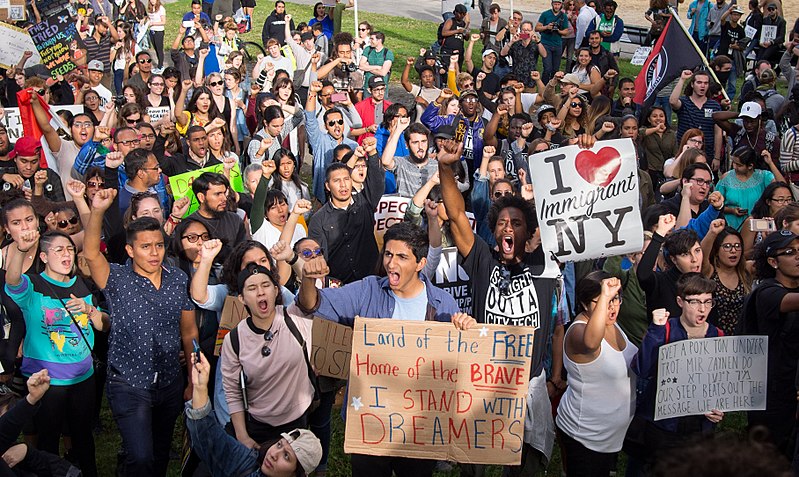DACA: Should it stay or should it go?
The Deferred Actions for Childhood Arrivals policy was put in place during the Obama administration to shield undocumented people who immigrated to the United States as children, and now Trump’s staff is trying to shut it down.
January 15, 2020

Concerned citizens in New York City rally in response to Trump’s decision to revoke DACA.
Imagine being 15, eager to take your driver’s permit test. You excitedly tell your parents that you’re finally old enough to take the test and open a new stage of your life, just to be told that you’ll be unable to get a permit, license, or job due to your lack of legal papers. This is the reality that Dreamers, or people who were illegally brought into the US as children, must face.
Trump’s orders to end the Deferred Actions for Childhood Arrivals policy were met with high opposition in 2017. To this day, thousands of people are trying to keep Dreamers protected by DACA. On the week of Nov. 11, nine Supreme Court justices heard many arguments of people pleading to keep the policy in place, as the loss of this policy would be disastrous for families and communities across the country. Since the DACA policy was passed in 2012, politicians and citizens have voiced their opinions on this program. Many people press that the U.S. should improve its border protection and protect the country from “illegal aliens,” while others argue that these people must be protected, as they were brought to the U.S. as children. “My mom came here as a child, and I’m happy she moved here for the better,” sophomore Ashley Bademian said in support of DACA. Another sophomore, Lorelei Steiner, also voiced her opinion on DACA. “I think [DACA] has a neutral effect,” Steiner said.“[It’s just] more people moving in.”
“The Cut” states that three lower-court cases argued against those who wanted to bring down this policy because it would have a devastating impact on thousands of people. These lower-court decisions caused a ripple effect within the politics behind DACA, and as a result, the Trump administration heightened their concerns. Due to their intensified interest in the DACA policy, both citizens and politicians alike are tense. People across the country have traveled to D.C. to sit in on countless Supreme Court cases that deal with DACA, while others are voicing their anger with Trump’s decision to revoke this policy. “[My cousin] is such a great person and I would do anything for him,” Ariana Garcia, an out-of-state friend of mine, said. Garcia’s cousin is an undocumented immigrant, and she fears what will happen to him if DACA is shut down. “He came here when he was eight, so I really hope that Donald Trump doesn’t take away DACA because it’ll affect him greatly.” Concerns like Garcia’s aren’t uncommon; people all over the United States fear for the safety of their friends and family members.
On one side of the spectrum, people are worried for the wellness of their loved ones, while others worry about their safety being threatened by undocumented people. Many people argue that undocumented immigrants bring terrorism and violence with them from their home countries, but research proves quite the opposite. A study that the Marshall Project, a non-profit news organization, conducted showed no correlation between undocumented immigrants and crime rates. Cato Institute, another non-profit organization, confirmed this study by stating that the vast majority of research shows no link between illegal immigration and crime, and actually finds that illegal immigrants are less likely to do criminal activity than native citizens. Therefore, the existence of DACA and its protection of undocumented people isn’t endangering to native citizens, and arguing that it puts Americans at risk is troublesome.
If anything, we as citizens and the US government should be encouraging the DACA program; these immigrants bring culture and diversity to our country, and they also bring an economic boost. The Center for American Progress states that will bring $460.3 billion into the US economy, and if DACA were to end, California (which has the largest amount of DACA recipients) would lose about $6.3 billion. Not only is this a matter of economics and money, but also it’s simply immoral to deport a person who has only known the United States their entire life. Most Dreamers can’t remember their home country, and if they do, it’s very faint. As someone who is the daughter of immigrant parents, I sympathize with these immigrants since I know how hard it is to restart your life in a new, unfamiliar place. Deporting them to their country of origin is unfair to them, as they’ll have to start from ground zero.
DACA is a widely popular policy, and the loss of it would be devastating. If the Trump administration were to dismantle it, they would be met with hundreds of thousands of angry opposers. While the possibility of DACA being brought down is highly unlikely due to its many complications, the political climate is turbulent, and Dreamers deserve a stable and certain future.
























![The Phoenix varsity volleyball team lines up for the national anthem. “We were more communicative [with each other] during this game, and I feel like we kept our energy up, especially after the first set,” senior Jessica Valdov said.](https://theblazerrhs.com/wp-content/uploads/2024/10/DSC_0202-1200x800.jpg)










![Junior Alex Alkhal pitches the ball. “[I] just let it go and keep practicing so we can focus on our goal for the next game to get better as a team,” Alkhal said.](https://theblazerrhs.com/wp-content/uploads/2025/05/DSC_0013-1-1200x929.jpg)

























